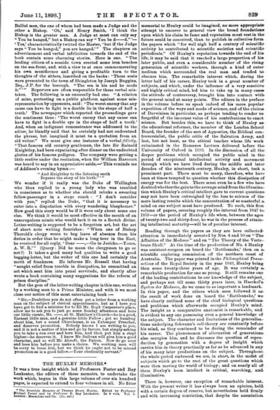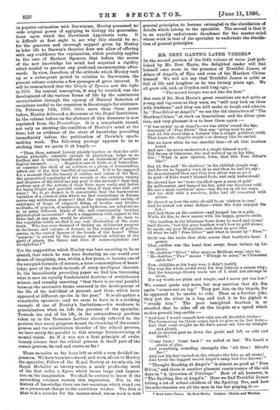THE HUXLEY MEMOIRS.* IT was a true insight which led
Professors Foster and Ray Lankester, the editors of these memoirs, to undertake the work which, begun in this large volume of over six hundred pages, is expected to extend to four volumes in all. No fitter
• The Scientific Memairs of Thomas Henry Huxley. Edited by Profemanr Michael Foster and by Profemr E. Ray Lankester. In 4 vols. VuL L London: Macmilian and Co. (25s. net.] memorial to Huxley could be imagined, no more appropriate attempt to uncover to general view the broad foundations upon which his claim to fame and reputation must rest in the future could be conceived, than to publish in collective form the papers which "for well nigh half a century of scientific, activity he contributed to scientific societies and scientific: periodicals." Of Huxley's reputation towards the end of his life, it may be said that it reached a large proportion of his later public, and even a considerable number of the rising generation of scientific workers, through a kind of outer medium which surrounded the real man and tended te. obscure him. The remarkable interest which, during the latter half of his career, Huxley took in a great number of subjects, and which, under the influence of a very sensitive and highly critical mind, led him to take up in many cases the attitude of controversy, brought him into contact with the general mind at many points. The editors in the preface in the volume before us speak indeed of his more popular exposition of the ways and needs of science, and of the claims of Darwinism in particular, as perhaps tending to render us- forgetful of the immense value of his contributions to exact science. Bat besides this, we have to think of Huxley as. the educational reformer, the member of the London School Board, the founder of the sect of Agnostics, the Biblical con- troversialist, the public critic of the Salvation Army, and last, but not least, as the ethical teacher whose life work culminated in the Romanes Lecture delivered before the University of Oxford in 1893. In the discussion of all the deeper problems which occupied the public mind in the period of exceptional intellectual activity and movement through which we have lived during the middle and later decades of the nineteenth century, Huxley, in short, took a. prominent part. There must be many, therefore, who have
been at times tempted to question whether this dissipation of energy was for the best. There must even be a few who have
doubted whether the gain to the average mind from the illumina- tion which Huxley's critical intellect gave to current questions may not have been outweighed by the loss to science of the more lasting results which the concentration of so masterful sa mind on one subject must have produced. To such, this first volume of papers, covering roughly the interval from 1847 to- 1859—or the period of Huxley's life when, between the ages of twenty-two and thirty-four, he was in the process of attain- ing intellectual maturity—will be of peculiar interest.
Reading through the papers as they are here collected, attention is immediately arrested by Nos. 4 and 50 on "The Affinities of the Medusm " and on "The Theory of the Verte- brate Skull." At the time of the production of No. 4 Huxley was assistant-surgeon on board the 'Rattlesnake,' then on a. scientific exploring commission off the northern coast of Australia. The paper was printed in the Philosophical Trans-. actions of the Royal Society in the year 1849, Huxley being then some twenty-three years of age. It was certainly a. remarkable production for one so young. It still remains one of the leading contributions to our knowledge of the subject„ and perhaps not till some thirty years later, in Haeckel's System der Medusen, do we come to as important a landmark. In this paper, and the others which soon followed it as the result of work done on board the 'Rattlesnake,' we- have clearly outlined some of the chief biological question. and problems which afterwards occupied Huxley's mind_ The insight as a comparative anatomist is remarkable, and is evident to any one possessing even a general knowledge of the subject. The character and limitations of the generalisa- tions underlying Schwann's cell-theory are constantly before his mind, as they continued to be during the remainder of his career. The phenomenon of alternation of generations also occupies him, and he discusses the question of repro- duction by gemmation with a degree of insight which carries him in theory practically as far as he advanced in any of his many later productions on the subject. Throughout. the whole period embraced we are, in short, in the midst of subjects which go to the root of the great questions whioh were then moving the world of biology ; and on nearly all of them Huxley's keen intellect is critical, searching, and illuminative.
There is, however, one exception of remarkable interest.. With the present writer it has always been an opinion, heldi with a certain degree of reserve, bat nevertheless held firmly, and with increasing conviction, that despite the association. in popular estimation with Darwinism, Huxley possessed no wide original power of applying to biology the generalisa- tions upon which the Darwinian hypothesis rests. It is difficult at first sight to see why this should be so; for the generous and thorough support given by Huxley in later life to Darwin's theories does not allow of offering with any confidence the explanation, which probably applies in the case of Herbert Spencer, that before the access of the new knowledge his mind had acquired a rigidity
which tended to prevent any profound reconstruction after- wards. In view, therefore, of the attitude which Huxley took
up at a subsequent period in relation to Darwinism, the present volume contains a few passages of great interest. It will be remembered that the Origin of Species saw the light in 1859. Its central conception, it may be recalled, was the development of the various forms of life by the continuous accumulation through the agency of Natural Selection of
variations useful to the organism in the struggle for existence. On February 15th, 1856, little more than three years
before, Huxley delivered a discourse at the Royal Institution. In the volume before us the abstract of this discourse is now reprinted from the Proceedings. It is a remarkable record, not only as showing the condition of Huxley's mind at the time, but as evidence of the state of knowledge prevailing immediately before the publication of Darwin's epoch- making work. The following passage appears to us so striking that we quote it at length :— "Thus, then, natural history plainly teaches us that the utili- tarian principle, valuable enough in physiology, helps us no further, and is utterly insufficient as an instrument of morpho- logical research Regard a case of birds or of butterflies, or examine the shell of an echinus, or a group of foraminifers, sifted out of the first handful of sea-sand. Is it to be supposed for a moment that the beauty of outline and colour of the first, the geometrical regularity of the second, or the extreme variety and elegance of the third are any good to the animals ? that they perform any of the actions of their lives more easily and better for being bright and graceful rather than if they were dull and plain ? So, to go deeper, is it conceivable that the harmonious variation of a common plan which we find everywhere in Nature serves any utilitarian purpose? that the innumerable variety of antelopes, of frogs, of clupeoid fishes, of beetles and bivalve mollusks, of polyzoa, of actinozoa, and hydrozoa, are adaptations to as many different kinds of life, and consequently varying physiological necessities ? Such a supposition with regard to the three last, at any rate, would be absurd If we turn to the vegetable world, we find it one vast illustration of the same truth. Who has ever dreamed of finding an utilitarian purpose in the forms and colours of flowers, in the sculpture of pollen- grains, in the varied figures of the fronds of the ferns ? What 'purpose' is served by the strange numerical relations of the parts of plants, the threes and fives of monocotyledons and dicotyledons P" Yet the supposition which Huxley was here asserting to be so absurd, that which he was here declaring no one would ever dream of imagining, was, within a few years, to become one of
the accepted formnlai of science, a mere commonplace of know- ledge, part of the stock-in-trade of every intelligent theorist. In the immediately preceding paper we find him traversing what is now an equally fundamental doctrine of evolutionary science, and roundly asserting "that there is no real parallel between the successive forms assumed in the development of the life of the indvidual at present, and those which have appeared at different epcchs in the past." It is altogether a remarkable spectacle ; and we seem to have in it a striking example of one of Huxley's limitatione,—his weakness in generalisation when he left the province of the specialist. Towards the end of his life, in the extraordinary position taken up in the Romans; Lecture already referred to, the position that social progress meant the checking of the cosmic process and the substitution therefor of the ethical process, we have surely the parallel to this strange foreshortening of mental vision. As if it was not a first principle of evolu- tionary science that the ethical process is itself part of the cosmic process, its end and crown so far 1 These memoirs so far have left us with a very decided im- pression. We have been introduced, as it were, afresh to Huxley the specialist., Fellow of the Royal Society at twenty-six, its
Royal Medallist at twenty-seven, a mind producing work of the first order, a figure which looms large and impres- sive on the imagination. We shall be curious to know if the succeeding volumes sustain this impression. For in the history of knowledge there are two warnings which stand out as a permanent charge to the ambitious worker. The first is that it is a mistake for the master-mind, whose work is with general principles, to become entangled in the elucidation of details which belong to the specialist The second is that it is an equally unfortunate decadence for the master-mind whose work is that of the specialist to undertake the elucida- tion of general principles.







































 Previous page
Previous page